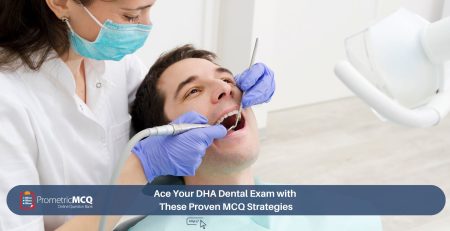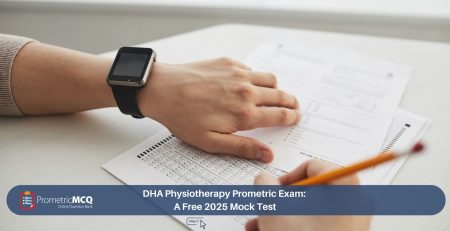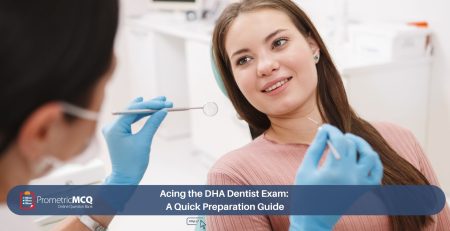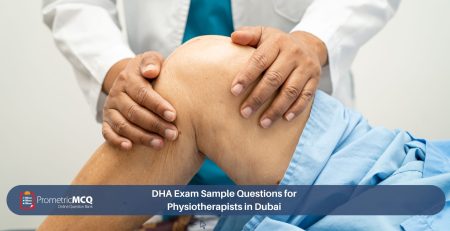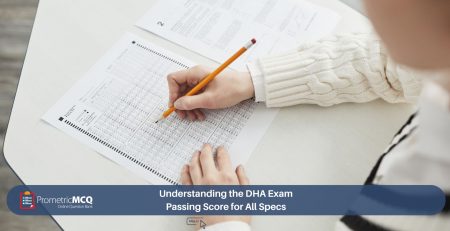
MOH UAE Exam for Physiotherapists: Essential MCQ Prep
fatima@prometricmcq.com2025-09-15T14:09:24+00:00Table of Contents
ToggleMOH UAE Exam for Physiotherapists: Essential MCQ Prep
For physiotherapists around the world, the United Arab Emirates offers a vibrant and technologically advanced environment to build a rewarding career. To practice in the Northern Emirates—including Sharjah, Ajman, and Ras Al Khaimah—securing a license from the Ministry of Health and Prevention (MOHAP) is the mandatory first step. The cornerstone of this process is the MOH UAE Exam for Physiotherapists, a rigorous assessment designed to ensure that practitioners possess the clinical reasoning skills and knowledge required to provide high-quality, safe patient care.
Many highly skilled physiotherapists find this exam challenging, not because they lack knowledge, but because they are unprepared for its specific format and question style. The MOH exam is not a test of rote memorization; it is an evaluation of your ability to apply theoretical principles to practical, case-based scenarios. This is why a generic review of textbooks is insufficient. The single most effective method for succeeding in this exam is through dedicated, strategic preparation using Multiple-Choice Questions (MCQs). An effective MOH Prometric exam preparation strategy is built around MCQs.
This comprehensive guide provides an in-depth roadmap to mastering the MOH Physiotherapy exam through essential MCQ preparation. We will deconstruct the exam’s pattern, provide a detailed breakdown of the high-yield syllabus topics, and explain why an MCQ-centric approach is the key to success. Complete with sample questions, detailed rationales, and a 10-point FAQ section, this article is your definitive resource for building the skills and confidence needed to pass on your first attempt and secure your UAE MOH license.
Key Takeaways for MOH Physio MCQ Prep
- MCQ Practice is Non-Negotiable: It is the most effective way to master the exam’s clinical reasoning style, improve speed, and identify knowledge gaps.
- Musculoskeletal Focus: This domain, particularly orthopedic special tests and post-operative rehab, forms the largest part of the exam.
- Patient Safety First: Be vigilant for red flags, understand the contraindications for modalities, and apply ethical principles in all scenarios.
- Unofficial Passing Score: The generally accepted passing mark is around 60%, but you must aim for 70-75% in practice to ensure a safe margin.
- No Negative Marking: Attempt every single question. An educated guess is always better than a blank answer.
Deconstructing the MOH Physiotherapy Exam Pattern
To build a successful MCQ strategy, you must first understand the structure of the exam. The MOH exam for physiotherapists is a computer-based test (CBT) designed to assess your competence in a standardized, objective manner.
- Format: Computer-Based Test (CBT) administered at a Prometric center.
- Question Type: 100% Multiple-Choice Questions (MCQs), typically with one best answer out of four options.
- Number of Questions: Usually consists of 100 to 150 questions.
- Duration: The time allotted is generally between 2.5 and 3 hours. This makes time management crucial—you have just over a minute per question.
- Content Style: The questions are overwhelmingly case-based. You’ll read a short clinical vignette describing a patient’s condition and then be asked to make a decision about assessment, diagnosis, or treatment.
The MOH exam isn’t just asking “what you know,” but “what you would DO.” This distinction is critical. Always choose the option that reflects the safest, most evidence-based clinical action.
The Power of MCQ-Based Preparation
While refreshing your knowledge with textbooks is important, passively reading is an inefficient way to prepare for this exam. An active, MCQ-based study plan is superior for several reasons:
- It Simulates the Real Exam: Practicing with MCQs familiarizes you with the question format, length, and style, reducing anxiety and improving performance on the actual test day.
- It Develops Clinical Reasoning: MCQs force you to apply knowledge. You have to analyze a scenario, form a differential diagnosis, and decide on a course of action, just as you would in a real clinic.
- It Identifies Your Weaknesses: A good question bank will provide performance analytics, showing you which syllabus areas you are struggling with. This allows you to focus your study time where it’s needed most.
- It Improves Time Management: Practicing under timed conditions hones your ability to read, analyze, and answer questions quickly and efficiently.
Syllabus Breakdown: High-Yield Topics for MCQ Focus
Your MCQ practice should be targeted. Focus your energy on the domains that carry the most weight on the exam. Our dedicated bank of MOH Physiotherapy MCQs is structured around this high-yield syllabus.
| Core Syllabus Domain | Essential MCQ Prep Focus |
|---|---|
| Musculoskeletal Physiotherapy | This is the most significant domain. Master your orthopedic special tests (e.g., Lachman’s, Hawkins-Kennedy, FABER). Be an expert on post-operative rehabilitation protocols for ACL reconstruction, Total Knee/Hip Replacement, and rotator cuff repair. Expect questions on joint mobilization grades and spinal conditions. |
| Neurological Physiotherapy | Focus on the classic presentations and physiotherapy management of Stroke, Spinal Cord Injury (know your ASIA scale), TBI, Multiple Sclerosis, and Parkinson’s Disease. Memorize key assessment scales like the Berg Balance Scale, Modified Ashworth Scale, and Glasgow Coma Scale. |
| Cardiopulmonary Physiotherapy | Know the phases of cardiac rehabilitation and the associated MET levels. Understand contraindications to exercise for cardiac patients. Master airway clearance techniques and be able to interpret the Borg Scale for dyspnea and Rating of Perceived Exertion (RPE). |
| General Physiotherapy & Professional Ethics | This includes the physics, indications, and absolute contraindications for all major electrotherapy modalities (Ultrasound, TENS, IFC, SWD). Be prepared for questions on gait analysis, ergonomics, pediatric milestones, and professional ethics. |
Sample MCQ Analysis
Let’s break down a sample question to illustrate the thought process.
A 68-year-old male is referred to physiotherapy 2 days after a Total Hip Replacement (THR) via a posterior approach. Which of the following instructions is most critical to give the patient to prevent dislocation?
- Avoid hip extension beyond neutral.
- Avoid crossing your legs and sleeping on the operated side.
- You can bend down to tie your shoes as long as you keep your knee straight.
- Actively abduct your operated leg as far as possible to strengthen the muscles.
Correct Answer: B
Rationale: A posterior approach for THR involves dissecting the posterior capsule and external rotators. This makes the hip most vulnerable to dislocation with a combination of three movements: hip flexion > 90 degrees, hip adduction past midline, and hip internal rotation. Option B directly addresses two of these key precautions: avoiding adduction (crossing legs) and avoiding a potentially unstable sleeping position. This is the most critical safety instruction.
Why other options are incorrect:
A: While excessive extension can be a concern with an *anterior* approach, it is not the primary precaution for a posterior approach.
C: Bending down to tie shoes involves significant hip flexion, likely far beyond 90 degrees, which is a major risk for dislocation and is strictly contraindicated.
D: While strengthening is important, encouraging maximum active abduction in the very early post-op phase is not the priority. The priority is preventing dislocation through education on precautions.
Frequently Asked Questions (FAQs) for the MOH Physio Exam
The exam is graded on a Pass/Fail basis, and MOHAP does not release an official passing percentage. However, based on candidate feedback and expert analysis, the generally accepted benchmark is around 60%. To be safe, your goal should be to consistently score 70-75% or higher on your practice MCQ tests.
The core clinical syllabus is virtually identical, as both exams are based on international standards of physiotherapy practice. The main difference is the jurisdiction: MOH is for the Northern Emirates, while DHA is for Dubai. Preparation for one exam will serve you very well for the other. The question style and emphasis on clinical reasoning are highly similar.
A good target for thorough preparation is between 2,000 and 3,000 high-quality MCQs. This volume ensures you have been exposed to a wide variety of clinical scenarios across the entire syllabus and have had enough practice to build speed and confidence. Quality is key—use a question bank with detailed rationales.
Yes. You may not be asked complex statistical questions, but you are expected to understand the principles of evidence-based practice (EBP). This includes knowing the hierarchy of evidence (e.g., that a systematic review of RCTs is the highest level) and being able to choose an intervention based on the best available evidence. This aligns with global standards promoted by organizations like World Physiotherapy.
The most common mistake is poor time management. Many candidates spend too long on difficult questions, leaving them rushing at the end. An MCQ-based preparation strategy, with timed practice tests, is the best way to overcome this. The second biggest mistake is not reading the question carefully and missing keywords like “NOT,” “EXCEPT,” or “INITIAL.”
They are very important. You need to know more than just the indications and contraindications. Be prepared for questions that ask you to select the appropriate parameters (e.g., frequency, pulse duration, duty cycle) for a specific condition. For example, using continuous (100% duty cycle) ultrasound for its thermal effects in a chronic condition versus pulsed (e.g., 20% duty cycle) for its non-thermal effects in an acute condition.
Typically, candidates are permitted three attempts to pass the Prometric exam. After three unsuccessful tries, you may be required to undergo a period of additional training before you can reapply. It’s crucial to check the latest regulations on the MOHAP portal.
Upon passing, you will receive an eligibility letter. The next mandatory step is to complete the Primary Source Verification (PSV) with the DataFlow Group, which verifies your credentials. After clearing PSV and securing a job, your employer will activate your MOH license.
Yes, you should be familiar with the purpose and application of the most common ones. For example, know that the Berg Balance Scale assesses fall risk in the elderly, the Modified Ashworth Scale grades spasticity, the ASIA scale classifies spinal cord injuries, and the VAS/NPRS are used for pain.
The final two weeks should be for consolidation and simulation. Do not try to learn new topics. Instead, focus on taking full-length (100-150 question) timed mock exams to perfect your pacing and build mental stamina. Review your notes on high-yield “must-know” facts like red flags, cranial nerves, and post-op protocols. The day before the exam, relax your mind and get a good night’s sleep.
Conclusion: Your MCQ Blueprint for Success
The MOH UAE Exam for Physiotherapists is a gatekeeper designed to uphold the highest standards of care. While the syllabus is broad, your path to passing it is narrow and well-defined: it runs directly through consistent, high-quality MCQ practice. By adopting the strategies in this guide—understanding the exam pattern, focusing on high-yield topics, and dedicating yourself to an MCQ-based study plan—you transform your preparation from a passive review into an active, skill-building exercise. This is the blueprint for walking into the exam with confidence and walking out with a “Pass.”
Ready to Turn Your Preparation into a Passing Score?
Our comprehensive MOH Physiotherapy Question Bank is filled with hundreds of clinical scenarios, detailed rationales, and mock exams designed to perfectly simulate the real test.

